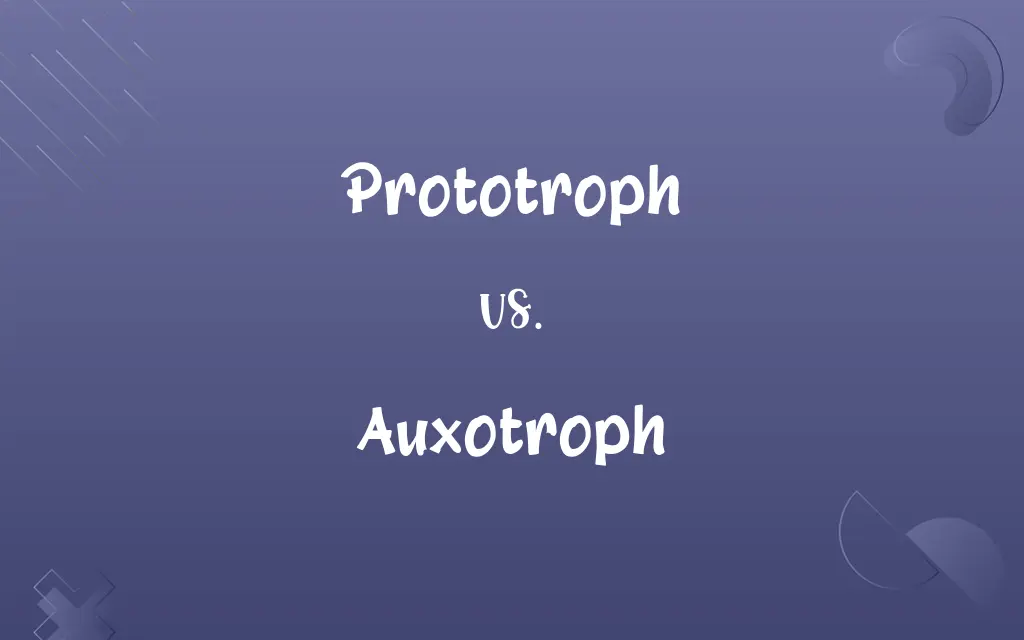Prototroph vs. Auxotroph: Know the Difference

By Shumaila Saeed || Updated on December 25, 2023
A prototroph is a microorganism that can synthesize all its nutrients from basic, inorganic substances, while an auxotroph cannot and requires specific additional nutrients.

Key Differences
A prototroph is a microorganism that can synthesize all its necessary metabolic compounds from basic nutrients, implying self-sufficiency in nutrient acquisition. This means a prototroph can grow in minimal media, which only provides the most basic nutrients. In contrast, an auxotroph is a microorganism that has lost the ability to synthesize one or more essential compounds necessary for its growth, requiring those compounds to be supplied externally.
Shumaila Saeed
Dec 03, 2023
The difference between prototrophs and auxotrophs often lies in their genetic makeup. Prototrophs possess the complete set of genes necessary for synthesizing all their essential metabolic compounds. Auxotrophs, however, have mutations that result in the loss of ability to synthesize one or more essential compounds, making them dependent on external sources for these compounds.
Shumaila Saeed
Dec 03, 2023
In laboratory settings, prototrophs are often used as a standard or control because of their ability to grow in minimal media without additional supplements. Auxotrophs, on the other hand, are frequently used in genetic and molecular biology research to study metabolic pathways, gene functions, and nutrient requirements, as their growth is conditional on specific supplements.
Shumaila Saeed
Dec 03, 2023
From an evolutionary standpoint, prototrophs represent a more ancestral or basic state, having the complete set of metabolic capabilities. Auxotrophs, conversely, are seen as having evolved from prototrophs through mutations that led to the loss of certain biosynthetic pathways, making them dependent on external sources for those lost functions.
Shumaila Saeed
Dec 03, 2023
In terms of environmental adaptation, prototrophs are generally more versatile and can thrive in a variety of environments due to their self-sufficiency in nutrient synthesis. Auxotrophs, due to their specific nutritional requirements, may have a more limited range of environments where they can survive and grow, as they depend on the availability of specific nutrients they cannot synthesize.
Shumaila Saeed
Dec 03, 2023
ADVERTISEMENT
Comparison Chart
Nutritional Requirement
Can synthesize all nutrients independently
Requires specific nutrients for growth
Shumaila Saeed
Dec 03, 2023
Research Use
Studied for basic biological processes
Used to study specific metabolic pathways
Shumaila Saeed
Dec 03, 2023
Application
Baseline for comparative studies
Crucial in genetic engineering and research
Shumaila Saeed
Dec 03, 2023
ADVERTISEMENT
Prototroph and Auxotroph Definitions
Prototroph
Wild-type organism in genetics
Prototrophs represent the original genetic strain.
Shumaila Saeed
Nov 25, 2023
Auxotroph
Nutritionally dependent microorganism
The auxotroph requires additional nutrients to grow.
Shumaila Saeed
Nov 25, 2023
Prototroph
Self-sufficient microorganism
The prototroph can grow in a simple medium without supplements.
Shumaila Saeed
Nov 25, 2023
Auxotroph
Used in metabolic pathway studies
Auxotrophs help identify functions of specific genes.
Shumaila Saeed
Nov 25, 2023
Prototroph
Capable of synthesizing all nutrients
A prototroph synthesizes its own amino acids.
Shumaila Saeed
Nov 25, 2023
ADVERTISEMENT
Auxotroph
Incapable of synthesizing certain nutrients
An auxotroph cannot make its own vitamin B12.
Shumaila Saeed
Nov 25, 2023
Prototroph
Independent in nutrient synthesis
The prototroph does not need additional growth factors.
Shumaila Saeed
Nov 25, 2023
Auxotroph
Mutant strain in genetics
Auxotrophs often arise from genetic mutations.
Shumaila Saeed
Nov 25, 2023
Prototroph
Standard in comparative studies
Prototrophs serve as a control group in genetic experiments.
Shumaila Saeed
Nov 25, 2023
Auxotroph
Dependent on supplemented media
The auxotroph grows only with added amino acids.
Shumaila Saeed
Nov 25, 2023
Prototroph
Having the same metabolic capabilities and nutritional requirements as the wild type parent strain
Prototrophic bacteria.
Shumaila Saeed
Oct 19, 2023
Auxotroph
An organism, such as a strain of bacteria, that has lost the ability to synthesize certain substances required for its growth and metabolism as the result of mutational changes.
Shumaila Saeed
Oct 19, 2023
Prototroph
(biology) Any microorganism that can synthesize its nutrients from inorganic material
Shumaila Saeed
Oct 19, 2023
Auxotroph
Any microorganism that has lost the ability to synthesize an organic compound required for its growth, usually as a result of mutation
Shumaila Saeed
Oct 19, 2023
Repeatedly Asked Queries
Can auxotrophs survive in the wild?
Their survival depends on the availability of required nutrients in their environment.
Shumaila Saeed
Dec 03, 2023
Are auxotrophs naturally occurring?
They can occur naturally, but are often laboratory-created for research.
Shumaila Saeed
Dec 03, 2023
Is a prototroph always the wild-type strain?
Usually, it represents the original, unmutated strain of an organism.
Shumaila Saeed
Dec 03, 2023
Are prototrophs used in food production?
Some prototrophic microorganisms are used in fermentation processes.
Shumaila Saeed
Dec 03, 2023
Do prototrophs have a role in ecology?
Yes, they often play key roles in ecosystem nutrient cycles.
Shumaila Saeed
Dec 03, 2023
Are all bacteria either prototrophs or auxotrophs?
Most bacteria can be classified as one or the other based on their nutritional needs.
Shumaila Saeed
Dec 03, 2023
Can auxotrophs be used in biotechnology?
Yes, especially in genetic engineering and pharmaceutical production.
Shumaila Saeed
Dec 03, 2023
Can human cells be prototrophic or auxotrophic?
Human cells are generally considered auxotrophic as they require external nutrients.
Shumaila Saeed
Dec 03, 2023
Can a prototroph become an auxotroph?
Yes, typically through genetic mutations that impair nutrient synthesis.
Shumaila Saeed
Dec 03, 2023
Can prototrophs grow in any medium?
They can grow in minimal media but might thrive better with supplements.
Shumaila Saeed
Dec 03, 2023
Is the study of prototrophs important in agriculture?
Yes, especially in understanding soil microbes and plant interactions.
Shumaila Saeed
Dec 03, 2023
Can auxotrophs be used in disease research?
They are valuable in studying pathogen-host interactions.
Shumaila Saeed
Dec 03, 2023
Are all auxotrophs genetically identical?
No, different auxotrophs can have different genetic mutations.
Shumaila Saeed
Dec 03, 2023
Can auxotrophs be used in educational settings?
They are commonly used in teaching genetics and microbiology.
Shumaila Saeed
Dec 03, 2023
Are prototrophs more common than auxotrophs?
In natural environments, prototrophs are generally more prevalent.
Shumaila Saeed
Dec 03, 2023
Do auxotrophs always need the same nutrients?
The required nutrients vary depending on the specific metabolic deficiency.
Shumaila Saeed
Dec 03, 2023
How are auxotrophs identified?
Through growth experiments in media with and without specific supplements.
Shumaila Saeed
Dec 03, 2023
Can prototrophs revert to auxotrophs?
In rare cases, reverse mutations can occur.
Shumaila Saeed
Dec 03, 2023
Are auxotrophic mutations always harmful?
Not necessarily; they can be neutral or even beneficial in certain environments.
Shumaila Saeed
Dec 03, 2023
Do prototrophs contribute to biogeochemical cycles?
Yes, particularly in nitrogen and carbon cycles.
Shumaila Saeed
Dec 03, 2023
Share this page
Link for your blog / website
HTML
Link to share via messenger
About Author
Written by
Shumaila SaeedShumaila Saeed, an expert content creator with 6 years of experience, specializes in distilling complex topics into easily digestible comparisons, shining a light on the nuances that both inform and educate readers with clarity and accuracy.









































































